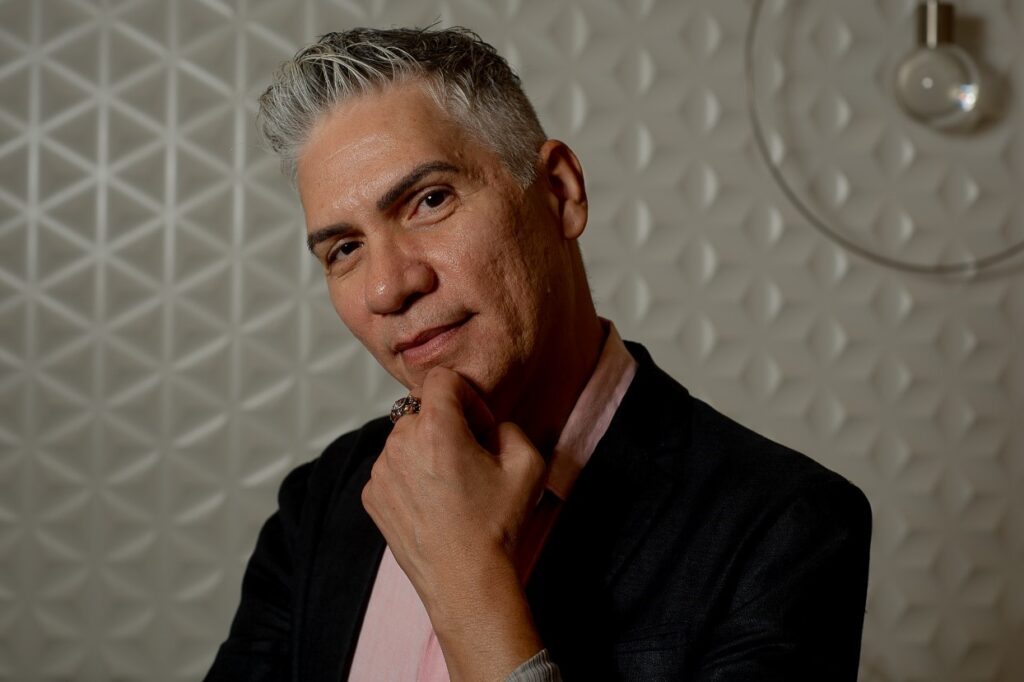 How do we get white heterosexual men to confront feelings of homophobia and sexism?
How do we get white heterosexual men to confront feelings of homophobia and sexism?
Rogerio Pinto, University Diversity & Social Transformation Professor at the University of Michigan, approaches this goal.
Rogério M. Pinto is a University of Michigan Diversity & Social Transformation Professor, Berit Ingersoll-Dayton Collegiate Professor of Social Work, and Professor of Theater and Drama, School of Music, Theater & Dance. Pinto conducts community-engaged research to investigate best practices for delivering sociomedical services to ethnic, racial, gender, and sexually minoritized groups; and to broadcast the voices of oppressed individuals. His art practices and artistic research include large installations, video and photography, fashion design, and performance. Pinto uses research findings and artwork to evoke community conversations (critical dialogues) designed to improve critical consciousness around sociopolitical issues.
Helping Straight Men Confront Homophobic and Sexist Beliefs
Research shows that both homophobia and sexism are associated with violence against gay men and women, respectively. Though this paper focuses on a convenience sample of heterosexual men of color, there is no evidence that men of color are more homophobic or sexist than White men. Indeed, most hate crimes are committed by White heterosexual men. So, what can we do to help abate homophobia and sexism? We believe that cisgender heterosexual men can critically examine their homophobic and sexist attitudes and behaviors and, by engaging in community conversations, they can develop more tolerance and empathy toward gay men and women.
Therefore, our study included heterosexual men who engaged in community conversations, small group discussions called critical dialogues. The content of the critical dialogues revolved around a commissioned painting that depicted people of different gender identities and sexual orientations. During critical dialogues, the study participants expressed their thoughts and feelings on heteronormativity, same-sex attraction, masculinities, and gender identities and expressions. We recorded the conversations, then we used the transcriptions to map out the participants’ process of critical reflection.
We noted a turning point, where participants began to question the beliefs that grounded their homophobic and sexist stances. For example, they began to compare racism, a form of oppression that affected them directly, with homophobia and sexism, oppressions that similarly affect gay men and women, respectively. So, what have we learned from the men in this study? Using transcriptions of critical dialogues, we developed an empirical explanation of how an artwork can stimulate critical reflection. Our findings support the use of artwork and critical dialogue as tools to help heterosexual men develop tolerance and empathy toward gay men and women. Further research is needed to test interventions aimed at combatting negative attitudes and destructive behaviors toward gay men and women.
Find me on
https://www.linkedin.com/in/rogerio-pinto-6a4953274/
https://www.instagram.com/rogeriomeirelespinto/
https://www.facebook.com/rogeriomeirelespinto
https://ssw.umich.edu/faculty/profiles/tenure-track/ropinto
https://scholar.google.com/citations?user=3XLfgw4AAAAJ&hl=en

Comments
One response to “Rogerio Pinto, University of Michigan – Helping Straight Men Confront Homophobic and Sexist Beliefs”